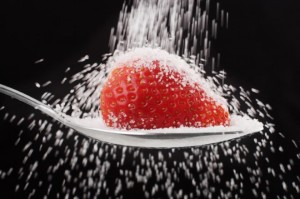 Artificial Sweeteners have become part of the fabric of today’s diets. With almost every soda drink offering their equivalent diet counterpart, and basically every favorite dessert also having it’s sugar-free version, we’ve all embraced the convenience and zero-calorie benefit of artificial sweeteners. With household names like Sweet-N-Low, Splenda, and Equal, like it or not, they’re here to stay! And with the continual increase in demand for these products, newer and better versions of these and other sugar substitutes continue to pour into the marketplace.
Artificial Sweeteners have become part of the fabric of today’s diets. With almost every soda drink offering their equivalent diet counterpart, and basically every favorite dessert also having it’s sugar-free version, we’ve all embraced the convenience and zero-calorie benefit of artificial sweeteners. With household names like Sweet-N-Low, Splenda, and Equal, like it or not, they’re here to stay! And with the continual increase in demand for these products, newer and better versions of these and other sugar substitutes continue to pour into the marketplace.
Artificial sweeteners have had their fair share of criticisms and health debates since it’s inception into the food industry dating as far back as the 1950′s. However, today we will not be talking about the health concerns relating to artificial sweeteners. Instead we will discuss whether or not artificial sweeteners have the same effect on dental and oral health as their counterpart, traditional sugar!
We all know that traditional sugar can cause all sorts of dental issues, like tooth decay or cavities, gum infection, and tooth loss. But do our teeth and gums react the same way to artificial sweeteners? In other words, can artificial sweeteners cause cavities and other dental problems similar to traditional sugar?
Traditional Sugar vs Artificial Sweetener
To begin, we need to look at why traditional sugars cause those dental problems. Our mouths contain enzymes and bacteria that help break down the foods we eat, that’s part of our overall digestive system. But when we break down, or metabolize sugar, an acid byproduct is also produced in the process. It is this acid that is the root of many of our oral and dental problems, including cavities. You can read more about the causes of cavities in our previous blog here.
So to determine if artificial sweeteners can cause dental problems similar to traditional sugar, we just need to rephrase our previous question. The question should be the following… Do artificial sweeteners produce acid when it metabolizes like traditional sugar?
And the answer to that is, NO! Artificial sweeteners do not produce an acidic byproduct that could lead to cavities and other dental problems. So there you have it. Although similar to the sweetness in traditional sugar, artificial sweeteners do not carry the same dental risks.
Other Sugar Substitutes
There are many forms of sugar substitutes. Artificial sweeteners are just one kind. Other sugar substitutes include sugar alcohols. Despite the name, sugar alcohols do not contain sugar or alcohol. For example, Xylitol is a sugar alcohol that is derived mostly from the fibers of natural fruits and vegetables. A great benefit of xylitol is it’s ability to aid in the prevention of cavities and reduction in plaque formation. Instead of producing acids like traditional sugar, xylitol actually reduces levels of the decay causing bacteria in our saliva. Common products with xylitol include chewing gum and breath mints.
Sugar alcohols are considered the darlings of sugar substitutes. Although not as sweet tasting as artificial sweeteners, they are equally as sweet and about a third of the calories compared to traditional sugars. According to a journal published in the CDA (California Dental Association), the optimal daily xylitol intake to reduce cavities is about 5 grams or 3 to 5 pieces of gum and mints combined.
One More Thing…
Although sugar substitutes do not have the same effect on your dental and oral health like traditional sugar, the jury is still out on their effect on your overall long term health. Like with all things, we recommend taking them in moderation! Their are pros and cons among sugar substitutes. Sugar alcohols like xylitol for example, do not provide zero-calorie benefit, but they are still much less in calorie compared to sugar and are natural. There are other natural sweeteners that offer similar low caloric advantages but without the cavity fighting benefit like xylitol. These are truvia, stevia, agave, real maple syrup, and black strap molasses, to name a few.
Thank you for reading and remember to Like Us on Facebook and never miss another blog!
Written by Dr. Kim H. Nguyen

Owner of Mint Dental OC and is a leading dentist in Southern California.
